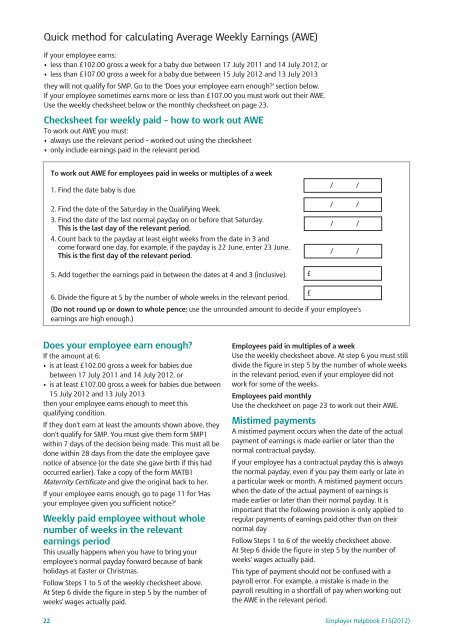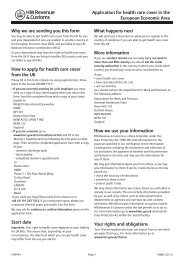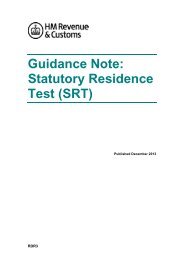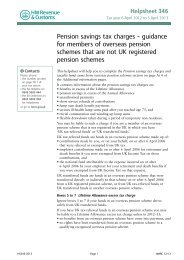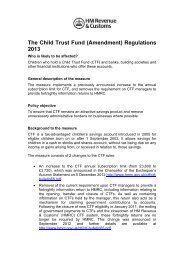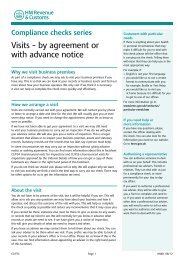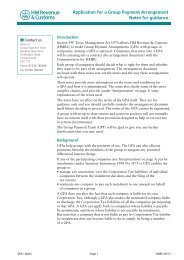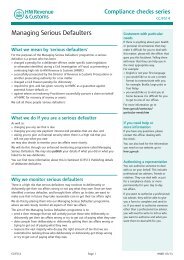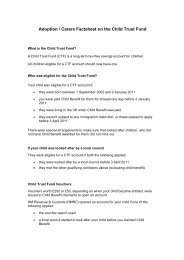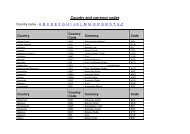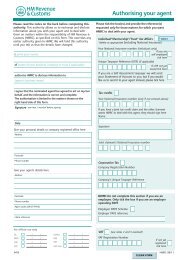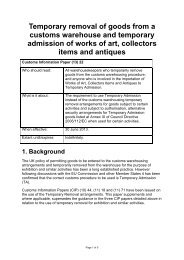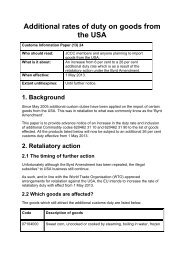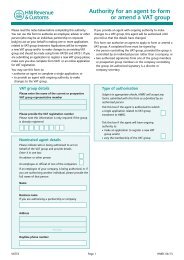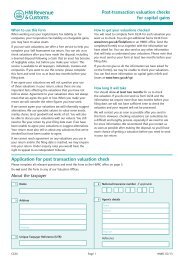Employer Helpbook for Statutory Maternity Pay - HM Revenue ...
Employer Helpbook for Statutory Maternity Pay - HM Revenue ...
Employer Helpbook for Statutory Maternity Pay - HM Revenue ...
Create successful ePaper yourself
Turn your PDF publications into a flip-book with our unique Google optimized e-Paper software.
Quick method <strong>for</strong> calculating Average Weekly Earnings (AWE)<br />
If your employee earns:<br />
• less than £102.00 gross a week <strong>for</strong> a baby due between 17 July 2011 and 14 July 2012, or<br />
• less than £107.00 gross a week <strong>for</strong> a baby due between 15 July 2012 and 13 July 2013<br />
they will not qualify <strong>for</strong> SMP. Go to the ‘Does your employee earn enough?’ section below.<br />
If your employee sometimes earns more or less than £107.00 you must work out their AWE.<br />
Use the weekly checksheet below or the monthly checksheet on page 23.<br />
Checksheet <strong>for</strong> weekly paid – how to work out AWE<br />
To work out AWE you must:<br />
• always use the relevant period – worked out using the checksheet<br />
• only include earnings paid in the relevant period.<br />
Does your employee earn enough?<br />
If the amount at 6:<br />
• is at least £102.00 gross a week <strong>for</strong> babies due<br />
between 17 July 2011 and 14 July 2012, or<br />
• is at least £107.00 gross a week <strong>for</strong> babies due between<br />
15 July 2012 and 13 July 2013<br />
then your employee earns enough to meet this<br />
qualifying condition.<br />
If they don’t earn at least the amounts shown above, they<br />
don’t qualify <strong>for</strong> SMP. You must give them <strong>for</strong>m SMP1<br />
within 7 days of the decision being made. This must all be<br />
done within 28 days from the date the employee gave<br />
notice of absence (or the date she gave birth if this had<br />
occurred earlier). Take a copy of the <strong>for</strong>m MATB1<br />
<strong>Maternity</strong> Certificate and give the original back to her.<br />
If your employee earns enough, go to page 11 <strong>for</strong> ‘Has<br />
your employee given you sufficient notice?’<br />
Weekly paid employee without whole<br />
number of weeks in the relevant<br />
earnings period<br />
This usually happens when you have to bring your<br />
employee’s normal payday <strong>for</strong>ward because of bank<br />
holidays at Easter or Christmas.<br />
Follow Steps 1 to 5 of the weekly checksheet above.<br />
At Step 6 divide the figure in step 5 by the number of<br />
weeks’ wages actually paid.<br />
22<br />
To work out AWE <strong>for</strong> employees paid in weeks or multiples of a week<br />
1. Find the date baby is due.<br />
2. Find the date of the Saturday in the Qualifying Week.<br />
3. Find the date of the last normal payday on or be<strong>for</strong>e that Saturday.<br />
This is the last day of the relevant period.<br />
4. Count back to the payday at least eight weeks from the date in 3 and<br />
come <strong>for</strong>ward one day, <strong>for</strong> example, if the payday is 22 June, enter 23 June.<br />
This is the first day of the relevant period.<br />
5. Add together the earnings paid in between the dates at 4 and 3 (inclusive).<br />
6. Divide the figure at 5 by the number of whole weeks in the relevant period.<br />
/ /<br />
/ /<br />
/ /<br />
/ /<br />
(Do not round up or down to whole pence; use the unrounded amount to decide if your employee’s<br />
earnings are high enough.)<br />
£<br />
£<br />
Employees paid in multiples of a week<br />
Use the weekly checksheet above. At step 6 you must still<br />
divide the figure in step 5 by the number of whole weeks<br />
in the relevant period, even if your employee did not<br />
work <strong>for</strong> some of the weeks.<br />
Employees paid monthly<br />
Use the checksheet on page 23 to work out their AWE.<br />
Mistimed payments<br />
A mistimed payment occurs when the date of the actual<br />
payment of earnings is made earlier or later than the<br />
normal contractual payday.<br />
If your employee has a contractual payday this is always<br />
the normal payday, even if you pay them early or late in<br />
a particular week or month. A mistimed payment occurs<br />
when the date of the actual payment of earnings is<br />
made earlier or later than their normal payday. It is<br />
important that the following provision is only applied to<br />
regular payments of earnings paid other than on their<br />
normal day<br />
Follow Steps 1 to 6 of the weekly checksheet above.<br />
At Step 6 divide the figure in step 5 by the number of<br />
weeks’ wages actually paid.<br />
This type of payment should not be confused with a<br />
payroll error. For example, a mistake is made in the<br />
payroll resulting in a shortfall of pay when working out<br />
the AWE in the relevant period.<br />
<strong>Employer</strong> <strong>Helpbook</strong> E15(2012)


